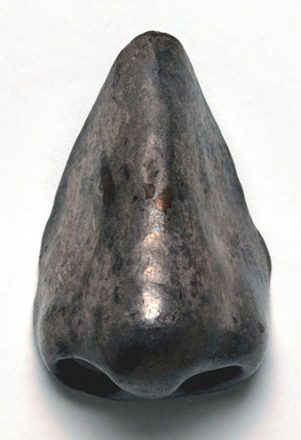
Robert Fludd (1574-1637) was an English physician and medical researcher of the early 17th century. The son of a royal minister to Elizabeth I, Fludd was educated at Oxford before taking further studies in France and Italy. He returned to Oxford in 1604 and completed a medical degree. He started a successful London practice and wrote on medicine, philosophy, alchemy, cosmology and other subjects.
A follower of the unconventional Paracelsus, Fludd’s theories and treatments combined conventional medical treatments with mysticism and superstition. In a 1631 essay Fludd defended the validity of the ‘weapon salve’, an ointment applied not to a wound but the object that caused it.
Like many Paracelsians, Fludd also believed that human body parts could be regrown or replaced. In support of this idea he cited the case of an Italian nobleman, who:
“…lost his nose in a fight or combate [duel]. This party was counselled by his physicians to take one of his slaves and make a wound in his arm, and immediately join his wounded nose to the wounded arm of the slave, and to bind it fast for a season, until the flesh of the one was united and assimilated to the other. The noble gentleman got one of his slaves to consent, for a large promise of liberty and reward… the double flesh was made all one and a collop or gobbet of flesh was cut out of the slave’s arm, and fashioned like a nose unto the lord [so that] it served for a natural nose.”
The third-party nose job worked for a time, until the slave – released as promised by his master – caught ill and died. According to Fludd’s account this caused the replacement nose to “gangrenate and rot”, requiring its removal. The noseless lord then repeated the process, this time using his own arm as a host. A second replacement nose was grown and transplanted, and remained with the nobleman until his death.
Source: Robert Fludd, Doctor Fludd’s Answer unto M. Foster &c., 1631. Content on this page is © Alpha History 2019-23. Content may not be republished without our express permission. For more information please refer to our Terms of Use or contact Alpha History.
